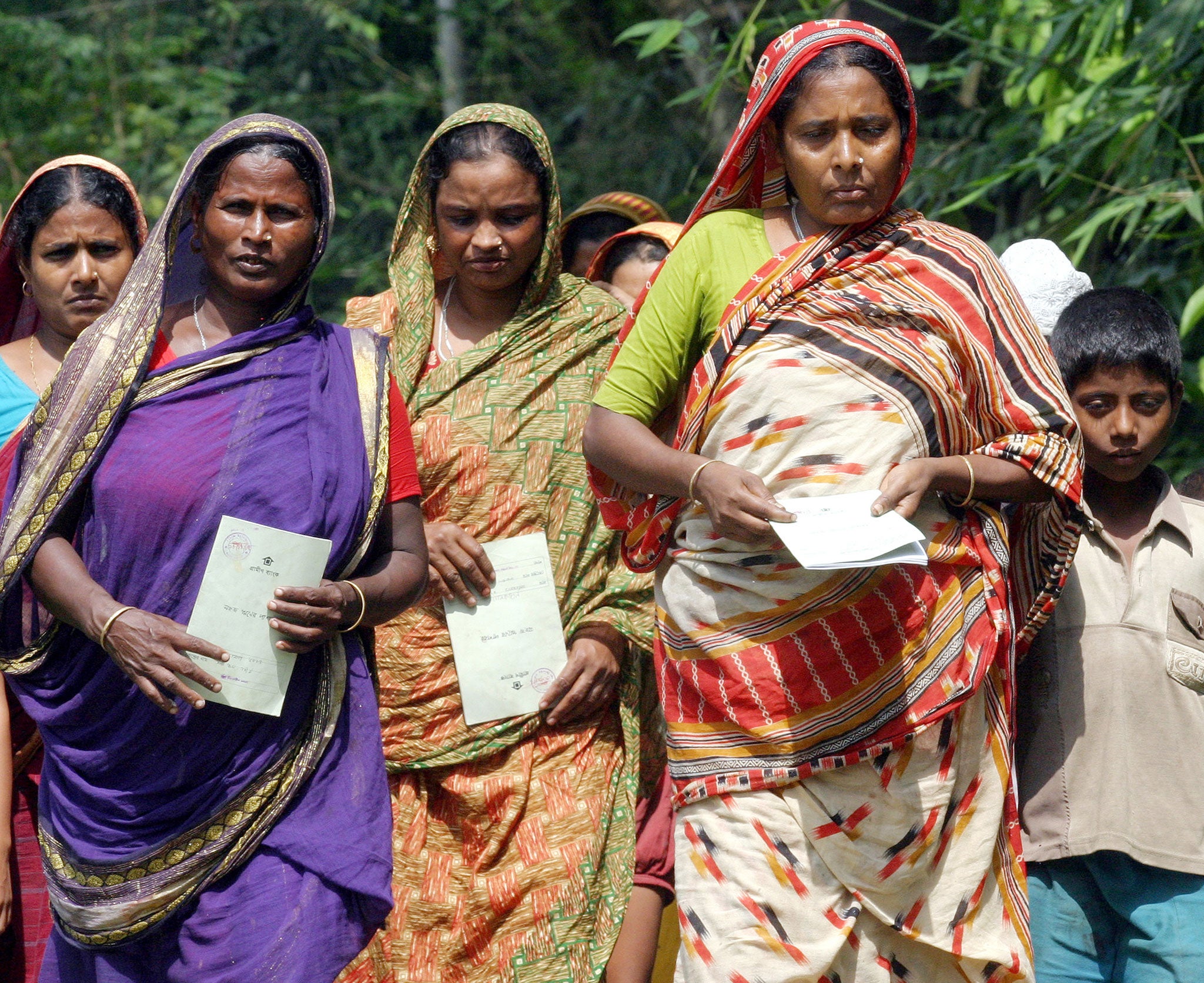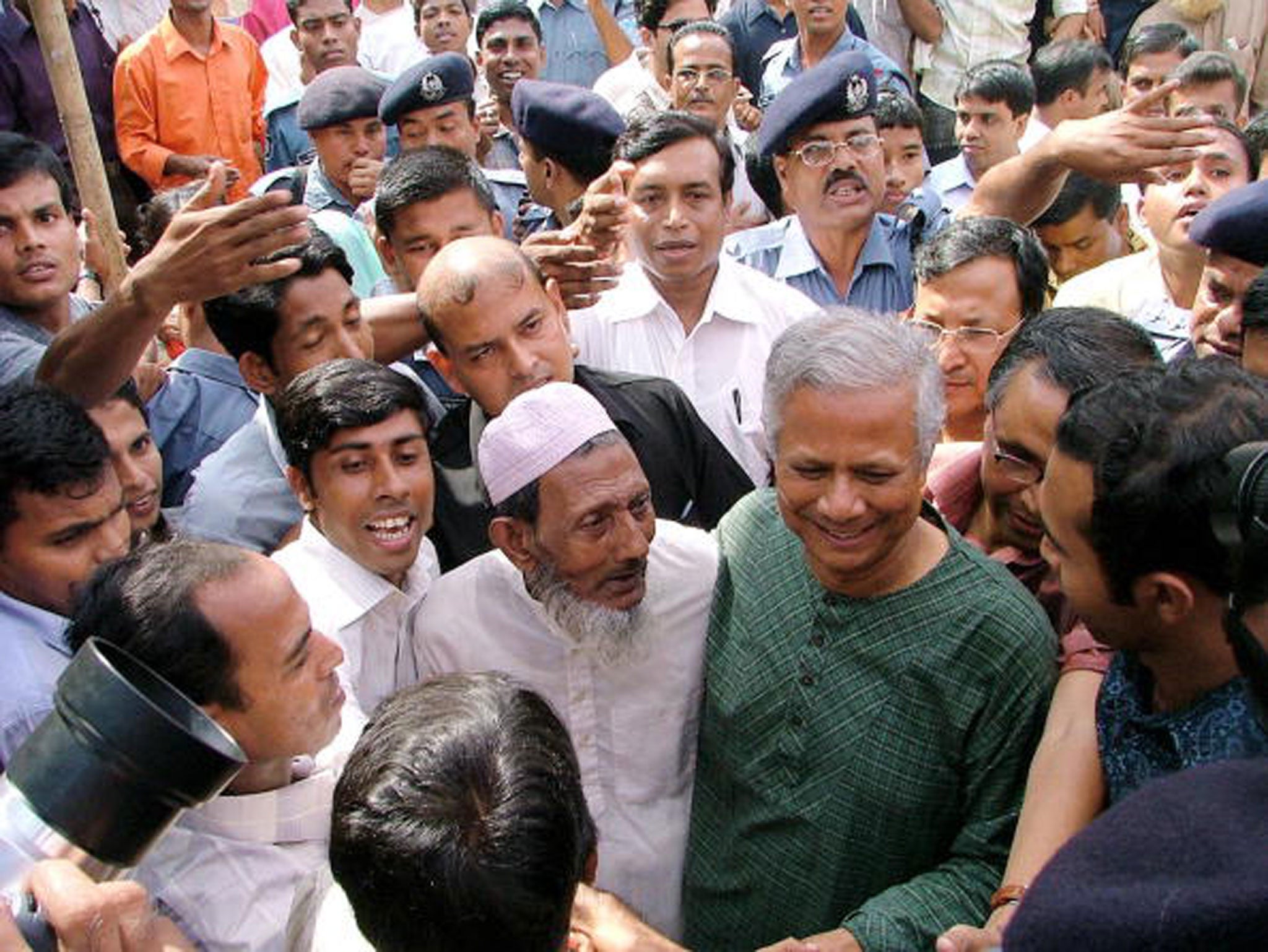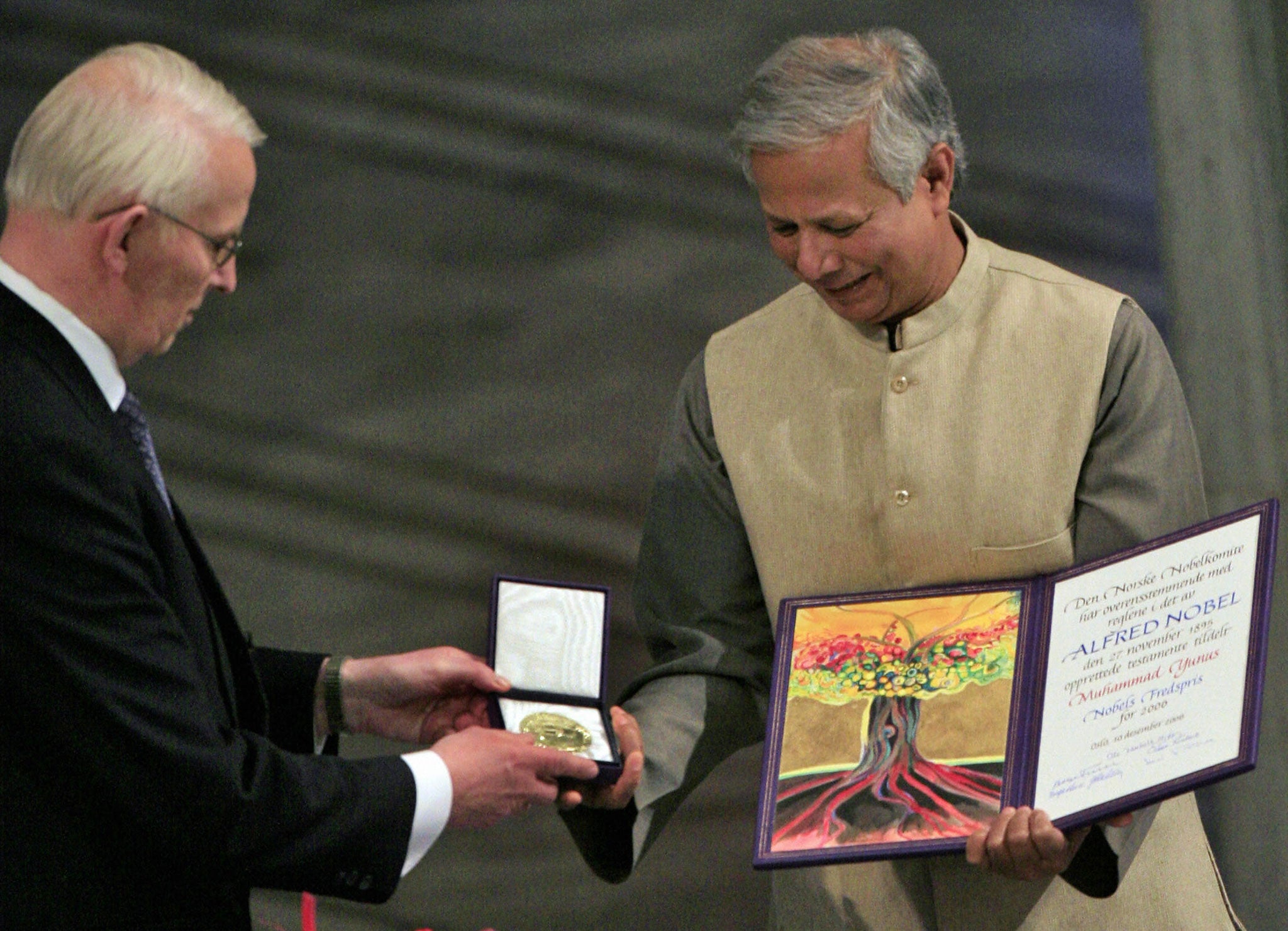'What did I do wrong?': Why the banker who helped millions of Bangladeshis out of poverty became his country’s enemy number one
Muhammad Yunus has helped lift 50 million of his fellow Bangladeshis out of poverty with loans of as little as £14.50. His work has won him the Nobel Prize - and been copied around the world. So why is he now being hounded by his own government? And why are thousands set to take to the streets this week to protest against him?
Your support helps us to tell the story
From reproductive rights to climate change to Big Tech, The Independent is on the ground when the story is developing. Whether it's investigating the financials of Elon Musk's pro-Trump PAC or producing our latest documentary, 'The A Word', which shines a light on the American women fighting for reproductive rights, we know how important it is to parse out the facts from the messaging.
At such a critical moment in US history, we need reporters on the ground. Your donation allows us to keep sending journalists to speak to both sides of the story.
The Independent is trusted by Americans across the entire political spectrum. And unlike many other quality news outlets, we choose not to lock Americans out of our reporting and analysis with paywalls. We believe quality journalism should be available to everyone, paid for by those who can afford it.
Your support makes all the difference.Muhammad Yunus is an unlikely target for a hate campaign. The 73-year-old economist is credited with lifting millions out of poverty with his pioneering concept of microfinance – a feat for which he was awarded the Nobel Peace prize. He is fêted by world leaders, renowned internationally and a national hero at home. All of which makes it harder to explain why the government in his native Bangladesh is trying to destroy him.
In the past few years, he has been removed as the head of the bank he founded, investigated for tax fraud and subjected to personal attack by the prime minister. And this week, a coalition of Islamist groups with links to the government will bring thousands on to the streets in Dhaka to denounce him. So why is a man known as the "banker to the poor" the target of so much ire?
Despite his age, Professor Yunus is an energetic man. He lives in Bangladesh but travels much of the year all over the world promoting and setting up social businesses to encourage the use of microcredit – the awarding of small amounts of money to those who are unable to get loans from traditional lenders.
The day I meet him, he is attending a conference for young people in Johannesburg; in a week he will be in Manila for another summit. He is so upbeat – "I enjoy talking to young people. I have been attending this conference for years now. I like it and I keep coming back" – that you wouldn't know he has the weight of the world on his shoulders.
Yunus's troubles began with a brief, but fateful, foray into politics during a period of crisis in Bangladesh in 2007. A military caretaker government was in power and the two squabbling, inefficient political parties that had run the country for decades were showing no sign that they were close to reaching a solution.
In an open letter to a Bangladeshi newspaper, Yunus – judging that his country was in need and still riding a wave of popularity from being awarded the Nobel Prize a year earlier – raised the possibility of forming his own political party, with a focus on routing entrenched corruption. This – even some of his allies concede – appears to have been a dramatic miscalculation.
The party was never launched, and two years later the secularist Awami League won national elections, returning to power its leader Sheikh Hasina – who had been arrested during the military's brief rule. Yunus's decision to intervene at a time when dozens of political leaders were being rounded up by the military angered Hasina, who saw the move as an attempt to isolate or perhaps even usurp her. Despite protestations that he was only trying to help his country in its time of need, Hasina never forgave Yunus.

Later that year, as prime minister, she began a campaign targeting the professor and Grameen Bank – the beating heart of the microfinance scheme he started in Bangladesh and joint recipient with Yunus of the 2006 Peace Prize.
In December 2010, Hasina accused Yunus of treating the bank as his "personal property" and of "sucking blood from the poor" by overcharging its customers. Months later, after several years of trying, the government succeeded in removing Yunus from his position as managing director of the bank, ostensibly because he was past retirement age.
The campaign against Yunus began to draw attention. Fifty charities and public figures led by former Irish president Mary Robinson said Yunus was the target of "increasingly aggressive attacks" that were "politically orchestrated". The New York Times columnist Nick Kristoff accused the prime minister of "mounting a scorched-earth offensive" against Yunus. The professor even received backing from the then-US Secretary of State, Hillary Clinton.
The appeals fell on deaf ears, however. In September this year, tax probes were launched against Yunus and his seven social-business firms, accusing them of evading millions of dollars in taxes – a charge he denies – and the campaign began again in earnest.
These days, Professor Yunus spends a lot of his time travelling. Since stepping down in 2007 from the "Elders" – the elite group of elder statesman and world leaders that includes Nelson Mandela, Jimmy Carter and Desmond Tutu – to concentrate on his work (the first person to leave the exclusive group), he has become a perennial conference-goer. Today is no different. He bounces through the hallways of the convention centre hosting the One Young World conference – established to nurture the leaders of tomorrow – stopping occasionally to bat away praise or answer a question from a precocious young delegate.
But away from the crowd he is more subdued. Shortly before sitting down to talk, he hears news that the Bangladeshi government has just passed a bill that paves the way for Grameen Bank to be taken under the control of the central bank.
He is reluctant to speak openly about his troubles with the government, but when it comes to the bank – his legacy – a hint of exasperation flashes across his face. "It will be a disaster," he says of the plan. "Everybody in Bangladesh knows that if any business is controlled by the government, it goes down. Now why do they want to do that for the bank?
"It is not just a personal thing," he adds. "Attack me as a person if you don't like me, but what wrong has the bank done? The bank is owned by the poor women, it is financed with their deposits. The bank should be under the control of those women. That's the way I had always wanted to keep it."
Yunus founded what would become Grameen Bank in 1976. As an economics professor, he used to visit the poorest residents in the village of Jobra near to his university in Chittagong. Through his trips there, he discovered that the lives of poor communities could be radically improved by loaning people small amounts of money. He began by issuing small loans to those too poor to provide any kind of guarantee. The recipients of the first loans were all women. Forty two of them, basket-weavers from the village of Jobra, received loans of around £14.50. The amounts were small, but the effects dramatic. Soon the scheme became so successful that even beggars were able to receive loans.
It worked by using a system of "solidarity groups" who would apply for loans together and act as co-guarantors. The bank says it has lifted around 50 million borrowers in Bangladesh out of poverty, and claims a repayment rate higher than most large banks.

In part thanks to Grameen Bank, microcredit went on to become a global success in tackling poverty. The model inspired similar efforts in about 100 developing countries, even in developed countries including the United States.
But as Professor Yunus's popularity has grown, so has the ferocity with which the government has pursued him. This week, in what is viewed as a further attempt to target him, a coalition of Bangladeshi Islamist groups with links to the government is to hold demonstrations over comments he made in 2012 supporting gay rights. Hundreds of imams, many of whom are on the government's payroll, are expected to take part in the protests on Thursday, according to organisers, who claim rallies will be held in 600 towns across the country. "Yunus must apologise for supporting homosexuality or he must be prosecuted for standing against the Koran and Islam," one organiser, Maolana Moniruzzaman Rabbani, has said.
For Yunus, it is just another stick with which to beat him. "They need to get at me somehow," he says. "They are now saying I am promoting gay marriage; that I am 'polluting' the country with 'immoral' things which go against religion. It is now a new front to attack me."
The Government campaign may be unwarranted, but Yunus periodically fights another battle: despite widespread acclaim and the Nobel Prize, there have been questions raised over the success of microcredit in recent years.
An article written in 2001 by the Wall Street Journal's Daniel Pearl that is frequently cited by critics cast doubt on the repayment rates claimed by the bank (more than 95 per cent, according to Grameen at the time). The article suggested that the interest rate on loans from Grameen were too high and that borrowers took too long to repay – making the model unsustainable.

In 2010, Dr Qazi Kholikuzzaman Ahmad, a Bangladeshi economist and chairman of a government body that monitors microfinance, described microcredit as a "death trap" for the poor, claiming that the ease with which people can receive credit under the system leads to irresponsible borrowing.
Perhaps the most vociferous opponent of the microcredit concept is Milford Bateman, a consultant on economic development and the author of Why Doesn't Microfinance Work?. Bateman calls microcredit "one of the most damaging interventions of recent times".
"Microfinance simply does not work, and never has," he says. "One way of pretending that it does work, however, is to flag up a few successes, stories typically on the websites of the main microfinance institutions. The proposition typically put forward that we can see 'some benefit to some people' so that this must prove that 'microfinance works, though it is not a magic bullet' is absolute tosh. It is akin to Sands Casino highlighting its jackpot winners in order to make the related claim that 'gambling reduces poverty, though it is not a magic bullet, but we must keep sending as many of the poor as possible to our casinos to give them their opportunity.'"
The debate comes down to a question of the reliability of the numbers being touted by various microcredit schemes, he adds. "The impact of microfinance has always been negative," Bateman says, citing a 2011 Department for International Development-funded study that raised doubts over its impact. "But it is the political support for microfinance that is crucial to its emergence and survival in spite of all the evidence showing then and since that it does not work."
Yet Yunus's supporters far outweigh his detractors. If microloans are damaging those who choose to partake, it is not dissuading more people from seeking them. Today, microcredit initiatives are thriving across the world. And at a microcredit summit earlier this month, nearly 800 delegates from 69 countries gathered to hear Yunus speak – the President of the World Bank Jim Yong Kim, opened the proceedings.
And despite the criticism, Professor Yunus insists his idea is still relevant. "Microcredit is doing very well around the world. Bangladesh has the largest numbers of borrowers of any country. We always had over 97 per cent or more repayment rate. There are 14,000 borrowers in New York, all women. The repayment rate is 99.04 per cent."
Yunus does, however, concede that some organisations are abusing the microcredit system for profit. A central criticism of microcredit is that although it works on a small scale, where borrowers can be monitored and even protected from falling too far into debt, when that model is used on a large scale, it can be damaging.
"Microloans are designed to improve income, not add to debt burden," says Yunus. "Some organisations are wrongly using microcredit for consumption loans. They are abusing the concept and creating debt burden."
And while the world of banking has some criticism for microfinance, Professor Yunus has some equally damning words for the world of banking. "It has lost its way," he says.
In times past, he explains, banks had a direct connection with the customer, helping alleviate poverty by lending to those who wanted to start their own business. Now, things are different.
"Banking has some fundamental flaws. It's only a service given to privileged people. Modern banking is more for corporate bodies than for human beings. They are not dealing with individuals. They are dealing with big business. That has to be fixed. You cannot leave out large numbers of people who need financial services."
After telling the youngsters at the One Young World conference – where he was greeted by the screams of 1,000 vuvuzelas – that they should "take chances", he confirms later that he thinks "The world will be changed by young people. After all, it is my generation who got things wrong. We have created a world that is not happy. We created poverty and unemployment. But these kids still don't realise how powerful they are."
Microcredit basics
Microfinance is an umbrella term for financial services provided to low-income individuals who do not have access to the regular banking system – big banks usually shun people who lack collateral, considering them too risky a prospect for loans or other services.
Microfinance loans – or microcredit – are small. As a development tool, the general idea is to help low-income individuals finance small-scale enterprises that can eventually support them and their families.
The loans usually carry high rates of interest, averaging nearly 30 per cent, according to figures published in July by the World Bank-based Consultative Group to Assist the Poor.
Among the factors that drive up the interest rates are the overheads involved in administering small loans. There are also costs associated with advancing credit to "risky" borrowers – people who usually don't have any fixed property to offer the lender as security.
Nikhil Kumar
Join our commenting forum
Join thought-provoking conversations, follow other Independent readers and see their replies
Comments